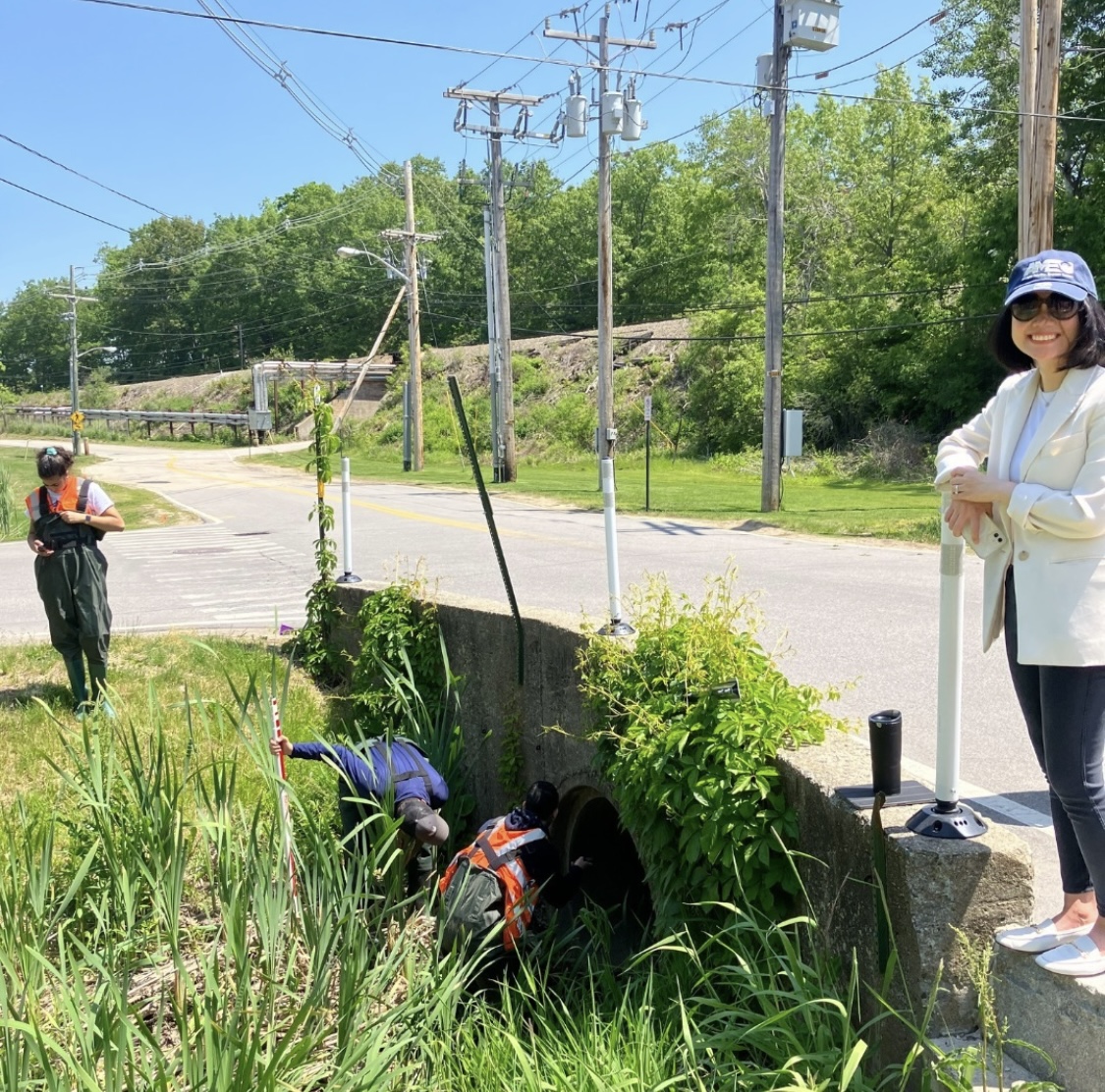 CAW Newsletter: Winter 2024
CAW Newsletter: Winter 2024

CAW’s Annual Rising Tides Event Returns
March 9-12, 2024
This January, two storms produced historic flooding, storm damage, and coastal erosion along New Hampshire’s tidal shoreline. Individuals, families, and businesses experienced significant and costly impacts. These events show that flooding is already a very challenging and real experience for people living and working along New Hampshire’s tidal shoreline. In response to these storms and feedback from past participants, the New Hampshire Coastal Adaptation Workgroup (CAW) is announcing updates to its annual Rising Tides Photo Contest, scheduled for March 9-12, 2024.
This year CAW renamed the event to “Picturing Rising Tides.” Picturing Rising Tides will generate visual and narrative documentation of high tide events and showcase the need to plan and prepare for an increasing frequency and extent of high tide flooding. Photographs and videos taken during the submission period, March 9-12, 2024, or in the last year (since March 13, 2023) are all eligible. Ten entries will be selected through a public voting process to display at local events, libraries, and community spaces. These displays will promote critical dialogue about rising sea levels.
We hope you will participate March 9-12, 2024, and help document the impacts of rising seas and efforts to prepare for flooding along New Hampshire’s tidal shoreline!
Important Details
What to Enter: Participants may submit photographs or videos that show high water, flooding, flood impacts, flood safety, flood mitigation, flood proofing, erosion, local landmarks, buildings, bridges, culverts, piers, seawalls, roadways, beaches, people, wildlife, salt marsh, rivers, and estuarine environments. Photographs and videos must be taken along New Hampshire’s tidal shoreline. For tips on where to go, explore the Picturing Rising Tides Map.
How to Enter: Photo and video entries must be submitted via the online entry form available on the CAW website during the Contest Submission Period, March 9-12, 2024. Entries submitted via mail, email, or social media will not be accepted.
Picturing Rising Tides Events
Back by popular demand, CAW will host two site visits during the submission period. These visits provide an opportunity to take photos or videos of high tide flooding and learn about local impacts of sea level rise. Volunteer board members and municipal staff, technical assistance providers, natural resource professionals, researchers and students, elected officials, interested residents or community leaders are especially encouraged to attend. Stay tuned for more information and event registration coming soon. Registration will be free.
Visit the CAW Website for official rules and more information about how to enter, what to enter, recognition, and events.
Questions? Contact Lucy Perkins at Lucy.L.Perkins@des.nh.gov or 603-559-9101.
Funding Opportunities
PREPA GRANTS 2024-25:
The Piscataqua Region Estuaries Partnership (PREP) invites proposals from municipalities, watershed groups, and partnering organizations within the Piscataqua Region Watershed for projects resulting in achievement or significant progress toward achievement of one or more of the proposed actions for their community identified in the 2020 Piscataqua Region Environmental Planning Assessment (PREPA), planning or regulatory projects to protect natural resources and/or water quality, or projects related to climate vulnerability, adaptation, and/or preparedness. Visit PREPA to review results by municipality from the 2020 assessment.
For 2024-2025 projects, eligible applicants may submit proposals requesting up to $25,000 in grant funding. A total of $100,000 is available for projects for 2024-2025. For all projects, a minimum of 15% must be budgeted for community engagement. For example, a project seeking $25,000 in grant funding must allocate at least $3,750 of grant funding toward community engagement. Applicants must outline how the project will advance diversity, justice, and inclusion as part of the application. Projects should be 12 to 18 months in duration and are expected to begin June 3, 2024, and conclude no later than December 12, 2025. You can read about previously funded projects on the PREPA Grants webpage. Example projects and average costs are available in the RFP. If you’d like to discuss a project idea, contact Abigail Lyon (Abigail.Lyon@unh.edu or (603) 862-3729).
NHDES Coastal Program’s Coastal Resilience Grants are coming soon – stay tuned!
Welcome, new CAW members!
In recent months, CAW has welcomed new members, including:
Dr. Weiwei Mo, an Associate Professor in the Department of Civil and Environmental Engineering at UNH. Weiwei comes from a traditional environmental engineering background, studying drinking water, wastewater, and stormwater systems. She is working with her students and the DES Coastal Program to survey and prioritize culvert management. As a member of CAW, Weiwei is excited about the opportunity to learn about communities’ and stakeholders’ needs and challenges related to climate resilience. She looks forward to collaborating and building partnerships that drive change at the local and regional levels.

Rodney Rowland, the Director of Facilities and Sustainability at Strawbery Banke Museum. Rodney brings a new perspective from an outdoor living history museum. Strawbery Banke is also committed to and excels at sharing information with visitors. This avenue for public outreach can help share stories from CAW and its membership.
In joining CAW, Rodney hopes to learn about climate change projections, best practices, and mitigation. This will help him and Strawbery Banke Museum plan for and navigate sea level rise.

NH Climate-related News
- US Interior Secretary Deb Haaland touts salt marsh preservation in Rye: Here’s Why [Ian Lenahan, Portsmouth Herald]
- FEMA tours storm damage at Hampton Beach, Rye. Will funds follow? [Max Sullivan, Portsmouth Herald]
- Gas meters underwater: What Hampton Beach area floods mean for NH energy infrastructure [Hadley Barndollar, New Hampshire Bulletin]
- Living on the edge: How coastal realtors are adapting following devastating floods [Tux Turkel, The Maine Monitor]
What are CAW members reading and listening to?
Here’s a roundup of what some CAW members are reading and listening to lately. Have more recommendations for us? Please send them our way!
- Braiding Sweetgrass by Robin Wall Kimmerer
- Shark Heart by Emily Habeck
- The Big Dig podcast
- The Lobster Coast: Rebels, Rusticators, and the Struggle for a Forgotten Frontier by Colin Woodard
- A recent Hidden Brain episode – Win Hearts, Then Minds
Great Bay Book Group
Our colleagues at the Great Bay Stewards and Conservation Law Foundation are hosting a coordinated book reading and region-wide discussion about the fight against a proposed oil shipping terminal on the Isles of Shoals, an oil refinery in Durham, and a 10-mile pipeline between the two. Join individuals, libraries, schools, and book groups across the watershed in reading Small Town, Big Oil by David Moore. See if your local library or school is already participating; if not, you can request free copies of the book for library or classroom use.
Also, save the date and reserve tickets for a free event on Thursday, April 25th at 3S Artspace in Portsmouth, with the book author, activists at the center of the story in the 1970s, and partners involved in environmental advocacy today.
2024 Great Bay Research Symposium Materials
Earlier this year, the Great Bay National Estuarine Research Reserve (GBNERR) worked with partners to host their second annual Research Symposium. This day-long event drew almost 80 attendees who gathered to discuss research, swap ideas, and connect with colleagues over their shared passion for Great Bay. This year’s theme was Innovations in Monitoring, and the presentation recordings, directory of monitoring programs, and summary of participant ideas can be found at the link below.
On a related note, GBNERR and UNH closely track the weather and water quality in Great Bay. Click here to see trends from a historically dry year in 2022, which experienced improved water quality that likely bolstered seagrass meadows.
Upcoming Webinar of Interest
Becoming a Great Bay Changemaker: Lessons on Advocacy from the Housing Crisis
Tuesday, March 26, 2024, 6:00-7:00 PM ET
This one-hour Zoom event will feature leaders sharing insights and stories from the housing crisis in NH and discuss how these lessons can be applied to support housing in the Great Bay Region. Gain valuable knowledge on effective advocacy and discover how you can make a meaningful difference moving forward. Don’t miss this opportunity to engage with experts, learn, and contribute to positive change in our local housing landscape!
This newsletter is brought to you by the NH Coastal Adaptation Workgroup, a collaboration of organizations working to assist communities in NH’s coastal watershed to prepare for the impacts of extreme weather and long-term climate change by providing resources, facilitation, and guidance that enhances readiness and resilience.
www.nhcaw.org
